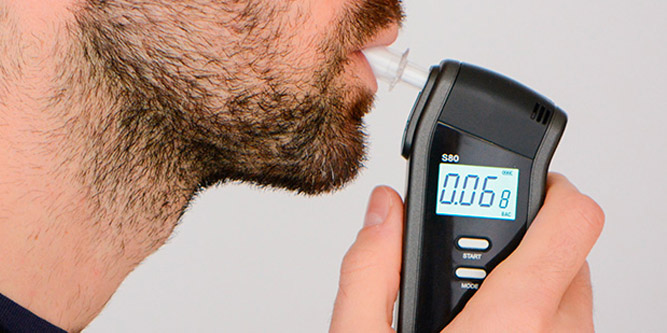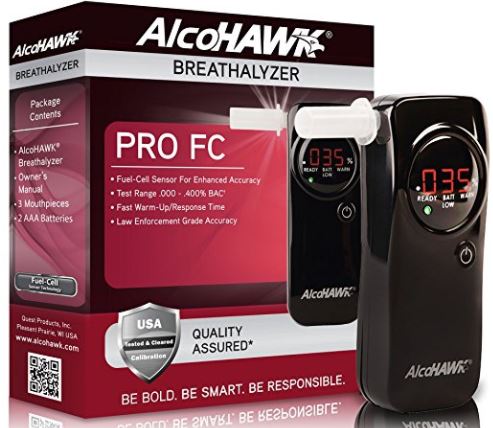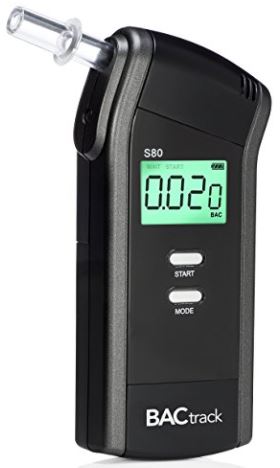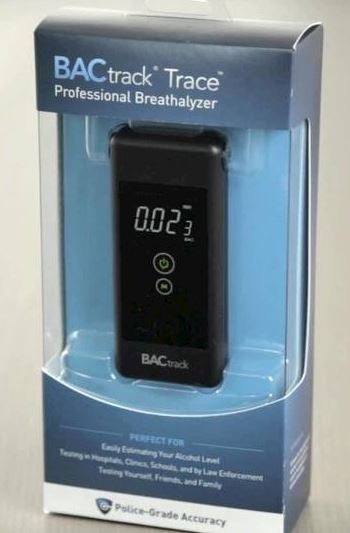You probably know breathalyzers as a tool used by law enforcement, but there’s actually a huge array of industries and applications for personal digital breathalyzers. Used correctly, a personal use breathalyzer can be a tool to ensure the safety of yourself and others. You might want to check a loved one for alcohol, or even just keep tabs on your own intoxication. And there’s no doubt that it’s much easier to talk someone out of driving when you’ve got data to support your claim.
But some people need a breathalyzer for more than personal use. Labs, clinics, and testing for businesses needs to be unshaking accurate. False positives or false negatives could lead to disastrous results, ranging from failing to identify a drunk person to getting someone fired when they haven’t been drinking at all. For the purposes of proof, you don’t want the accuracy of your breathalyzer to be under deserved scrutiny.
It’s not smart to relying on your best judgement, let alone your impaired judgement, to approximate how intoxicated you might be. Alcohol impairs your ability to judge safety, which is precisely what makes it so dangerous. But breathalyzer allows you to measure your blood alcohol content (BAC), which can help you make informed and responsible decisions.
Better than Subjective Measurement
Many people try counting drinks to determine whether or not they’re at risk of being intoxicated. That’s a dangerous mistake that’s doomed to failure. How much a drink will affect your BAC can change from day-to-day, depending on how much your weigh, the ratio of your fatty tissue to muscle mass, your metabolism, how fast you’re drinking, and what you’ve eaten recently.
Your emotional state can alter blood flow and slow down how fast you absorb alcohol. Becoming intoxicated becomes easier as you get older, so the few drinks that you used to handle easily can gradually become more of an issue. Many types of medications can affect your BAC or how intoxicated you may become, and even carbonation can increase how quickly alcohol gets into your system.
In other words, how impaired you feel with some particular BAC will vary widely from person to person. For instance, women reach a higher BAC than identically sized men drinking the same quantities of alcohol. That’s because women have lower water content in their bodies, and a woman’s body breaks down alcohol slower.
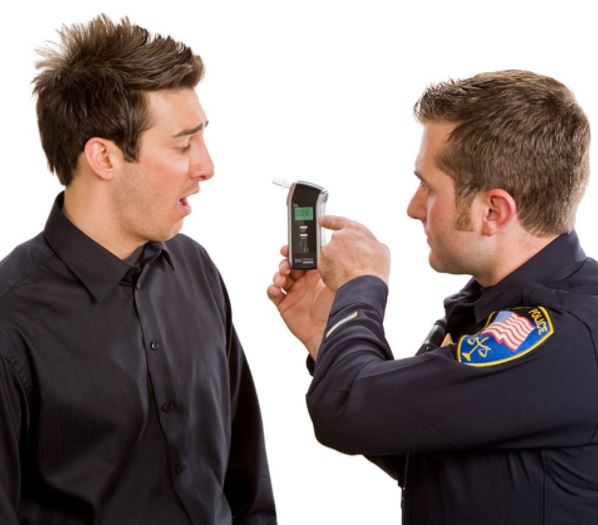
Subjective Differences in Intoxication
But even from one woman to another, the same BAC may reflect radically different levels of impairment. A person with a moderate 0.03% BAC may feel completely intoxicated, while another person with a compatibly higher 0.04% BAC may feel perfectly fine. And that impairment can change from moment to moment. Even 90 minutes after you’ve stopped drinking, alcohol continues to be absorbed into your body.
In summary, you have absolutely no chance of accurately gauging intoxication by counting drinks. On different occasions drinking the same quantity of alcohol, your BAC will be higher or lower depending on everything from what you had for lunch, to how anxious you’re feeling that day. The only way to get close to an accurate measurement of intoxication is measuring your BAC.
Staying Safe
Breathalyzers shouldn’t be used to help you decide if it’s safe to drive or not. It’s possible for you to be charged with a DUI even if your BAC is legal, provided that you are impaired to any degree at all. You do not need to exceed the legal 0.08% limit for intoxication to be held against you in court. Whether or not you’re intoxicated and unable to drive is a judgment call that only humans can make. If you think you’ve had too much to drink, don’t use a breathalyzer to convince you otherwise because it doesn’t measure whether or not you’ll be too intoxicated to drive over the next 90 minutes. Take a cab.
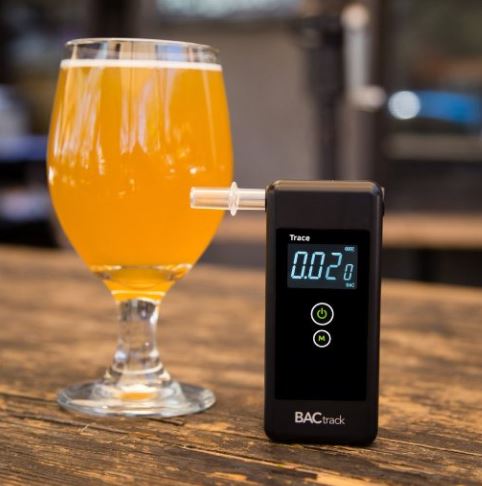
Choosing the Right Breathalyzer
For choosing a breathalyzer, you’ll have to navigate through the fuzzy lines of personal and professional use. There are two main types of breathalyzers on the market, largely based on the type of sensors they use to detect intoxication. Those sensors operate with either a semiconductor or a fuel cell.
Semiconductor sensors are typically used for breathalyzers undergoing low-volumes of testing. They’re a cheap and simple option for casual home use. Semiconductor technology is cheaper than using fuel cells, but even the best semiconductors struggle to reach more than moderate accuracy and scarcely acceptable response times. For regular use, semiconductor sensors will need calibration at least twice per year to maintain their moderate degree of accuracy. They’re an inexpensive option for someone who only needs a few dozen uses that are likely-enough to be accurate.
But for reliable accuracy and any significant volume of testing, you’re going to need something stronger. Fuel cells are better at providing both highly accurate and more consistent BAC results. Accuracy can matter a great deal if your BAC is approaching the line of intoxication, and consistency can be equally important when it comes to using the data to make decisions. Fuel cells provide a shorter startup time, and can perform sequential readings without much of a waiting period between blows. Plus, well-designed fuel cells may be able to remain accurate even after a thousand tests.
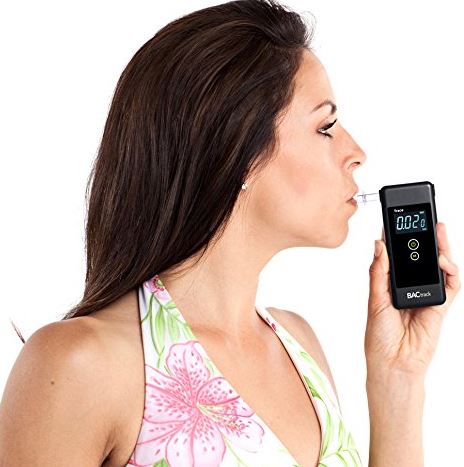
Accuracy and False Positives
To figure out the degree of accuracy you need, you’ll need to consider the purpose of your tests. For business or clinical applications, a high degree of accuracy is non-negotiable. In short, you’ll want the same quality design that’s used in law enforcement grade technology. You may want to know if even trace amounts of alcohol are present.
With cheaper and less sensitive breathalyzers, you won’t be able to detect smaller amounts of alcohol in the blood. Worse still, you may find yourself dealing with more false positives from people on low calorie diets, people with diabetes, or others known to gives false positives to unrefined sensors.
On the other hand, if you’re only dealing with casual readings of a few family members, then you probably won’t need to choose a device that’s rated to last through thousands of uses. Accuracy remains as important as ever, but if you probably won’t end up testing your entire community, there’s no need to choose a breathalyzer that’s built for those types of volumes.
Other Considerations
Can you recalibrate the device? All measurement hardware will eventually lose its accuracy, at which point it will need to be either recalibrated or replaced. Will you end up having to wait 40 seconds to get your results, or are they almost immediate? Do the results show up on an ordinary LCD, or do they use a backlit display to ensure the device is visible in dark environments? Depending on how many readings you’re taking, these types of considerations can make a great deal of difference in the long haul.
AlcoHAWK Pro FC Fuel-Cell Breathalyzer
Between the range of police-precision accuracy breathalyzers and inaccurate junk products, you can find a medium point. That medium point is the AlcoHAWK Pro FC. The Pro FC uses a fuel cell to guarantee fast and accurate results, and it has a high range of sensitivity that’s more than enough for non-commercial use.
The highly visible 3-digit LCD is ready to report even trace amounts of alcohol, and is supported by a sensor capable of reading traces amounts of BAC as remote as 0.003%. And since AlcoHAWK uses a fuel cell, their design ensures you’re ready to test inside of 0.003% to 0.4% BAC.
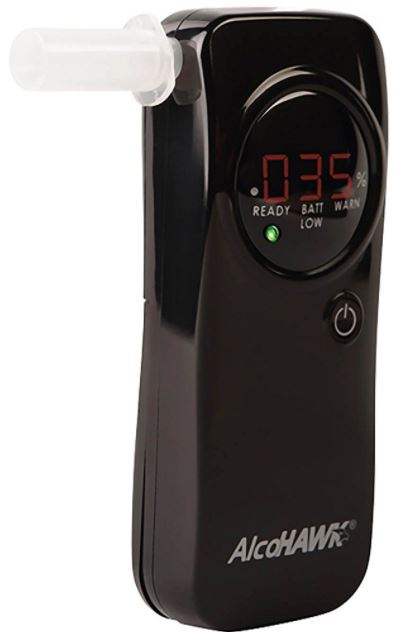
Operation and Design
Insert a disposable mouthpiece, press the power-on button, and wait 30 seconds for the sensor to warm-up. The AlcoHAWK will beep when it’s ready. From there, you can blow steadily into the mouthpiece until it beeps a second time. Give the device 20 more seconds, and you’ll have the results. That’s as easy as it should be to use a breathalyzer, and that’s as exactly what you get with AlcoHAWK.
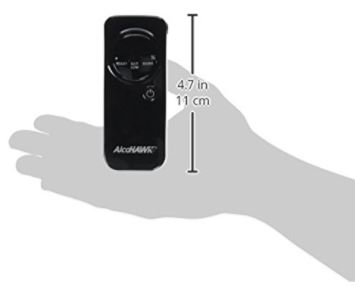
For added ease of use, you can program a red LED to go off alongside the BAC readout for any BAC results that go beyond a level that you’ve specified. The default is set to 0.05 BAC, which is a rough estimation of being too intoxicated to be able to safely operate machinery.
The Pro uses a super compact 4.5 x 1.8 x .08-inch design, and weighs just over two ounces. You’ll like the rubberized firm grip of the device, which helps ensure you won’t end up dropping it while intoxicated, and that it will survive a fall either way. The fuel cell is powered by two included AAA batteries, which should provide hundreds of tests before they need to be replaced.
BACtrack S80 Pro
BACtrack is has a reputation for accuracy, and for good reason. The S80 Pro uses a competitive fuel-cell design to stay portable, quick, and accurate. That design is what BACtrack to achieve police-grade accuracy, which is reliable for tracing BAC to the 3rd decimal of precision. From the time its turned on, the S80 Pro takes as little as 20 seconds to warm up. It’s also fully hygienic by supporting disposable mouthpieces, which aids in the long-term accuracy of the device as well.
BACtrack claims their S80 is rated to monitor BAC levels from zero to 0.4%. And independent testing has shown BACtrack performs within 0.01% accuracy of actual police gear, making it nearly as precise as the breathalyzers most trusted in the court of law. In other words, the S80 Pro doesn’t leave you having to worry about enduring a slew of false positives.
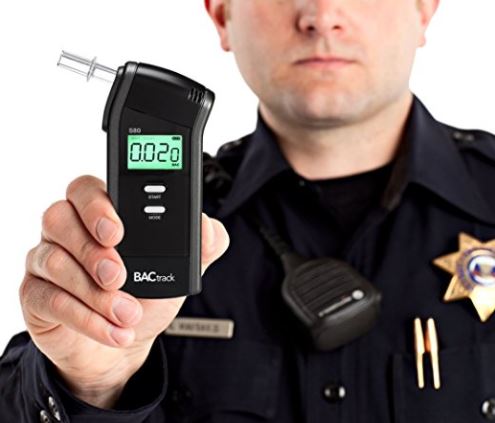
Operation and Design
The S80 uses a one button operation that’s as simple to use as it sounds. Pop in the two included AAA batteries and you’ll be ready to test. Results are ready inside of 10 seconds after blowing. The S80 Pro uses flash memory to store your last 10 readings for later, which is ideal for sequential testing. You can also fully adjust the blow time setting to either speed up testing or increase accuracy, as you see fit.
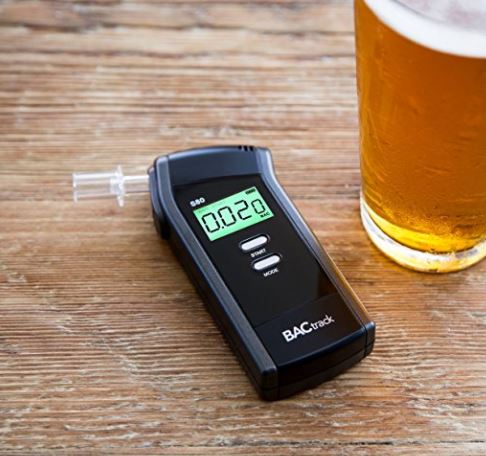
Although the fuel cell is slightly too difficult for an untrained consumer to calibrate on their own, the S80 Pro is designed to endure 1,000 tests before it needs to be mailed back to BACtrack to be calibrated. Mailing in for calibration will set you back about $20, which is convenient considering the quantity of tests you can get before calibration is necessary.
BACtrack products are approved by the US Department of Transportation, as well as the National Highway Traffic Safety Administration. The S80 pro in particular uses a full-bodied 4.25 x 1.875 x 0.625-inch design, which is a tad smaller than most smartphones, but a tad larger than other breathalyzers on the market. The S80 Pro includes a 30-day money back guarantee, a hard-shell carrying case, and a one-year warranty to further protect your investment.
BACtrack Trace
The Trace is another in BACtrack’s long line of formidable breathalyzers. Trace uses platinum fuel cell sensor and the same law enforcement grade sensors that are trusted by hospitals, so you’re ready with professional grade accuracy. And much like the S80 pro, Trace uses a powerful fuel cell sensor which both protects you from false positives and supports a full range of 0 to 0.4 BAC monitoring.
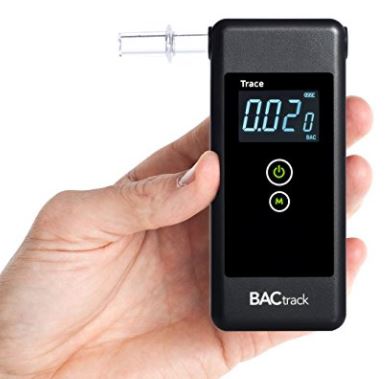
Operation and Design
Trace’s large and bright LCD display is easy to see, even for someone who’s had a few too many. It uses a simple one-button operation that’s equally easy to use, and sports the same DOT, NHTSA, and FDA approval as the S80 Pro. But what really makes the Trace different is its size.
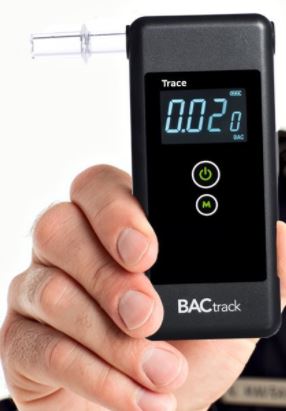
The Trace only weighs about three ounces, making it nearly 40% lighter than the S80 Pro, and the smallest and most portable design from BACtrack. It’s uses a highly compact 4.25 x 1.875 x 0.625-inch build, powered by two AAA batteries. Although there’s no included carrying case, you’ll still end up with BACtrack’s 30-day money back guarantee, and their one-year warranty.
Choosing Between 3 Accurate Breathalyzers
If you’re on a budget, AlcoHAWK Pro FC is great. It’s lightweight, inexpensive, and provides enough accuracy for most non-commercial uses. Its only real downsides are the fact that it takes much longer than BACtrack breathalyzers to warm up, and takes much longer to test. For back-to-back testing, you’re better suited with a different breathalyzer. But for casual home use, the AlcoHAWK will be more than enough.
If you want both accuracy and ease of use, then you want the S80 Pro. It’s been called the most reliable and accurate breathalyzer on the market, and it’s their most accurate device. Its slightly weightier than the Trace, but it’s also packed with extra features like a memory record and an audible alarm for high BAC levels. If you want all the bells and whistles a personal breathalyzer can offer, the S80 is your pick.
And finally, there’s the Trace. The BACtrack Trace is highly-accurate little sister of the S80 Pro. It’s highly portable, but has virtually nothing in the way of special features. But if accuracy is all you care about, the Trace will do the trick.
Meet Ry, “TechGuru,” a 36-year-old technology enthusiast with a deep passion for tech innovations. With extensive experience, he specializes in gaming hardware and software, and has expertise in gadgets, custom PCs, and audio.
Besides writing about tech and reviewing new products, he enjoys traveling, hiking, and photography. Committed to keeping up with the latest industry trends, he aims to guide readers in making informed tech decisions.

